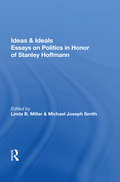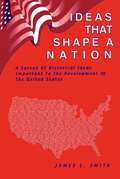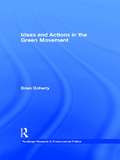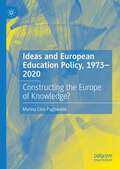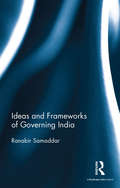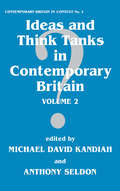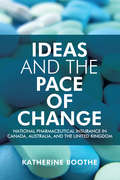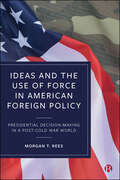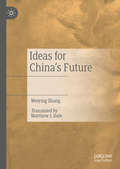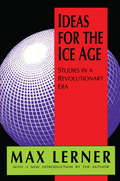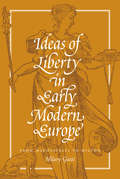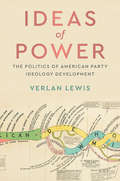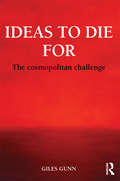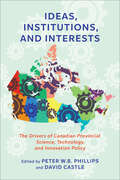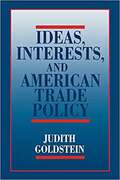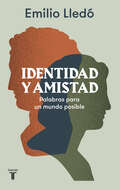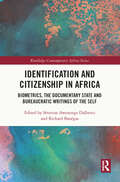- Table View
- List View
Ideas And Ideals: Essays On Politics In Honor Of Stanley Hoffmann
by Stanley HoffmannThis rich collection of original essays pays tribute to Stanley Hoffmann, a preeminent scholar of international relations and French politics who has inspired former students to explore the links between domestic society and foreign policy and between theory and practice. In two autobiographical chapters, Hoffmann traces his personal odyssey from F
Ideas That Shape A Nation: Historical Ideas Important To The Development Of The United States
by James L. SmithIdeas That Shape a Nation presents historical ideas in the original words of persons who influenced the development of the United States government, its laws, economic system, and social movements. The book is based on the premise that history is more than a mere chronicle of what people did; it is also an examination of what people thought.
Ideas and Actions in the Green Movement (Environmental Politics #Vol. 2)
by Brian DohertyThe 'Western' green movement has grown rapidly in the last three decades: green ministers are in government in several European countries, Greenpeace has millions of paying supporters, and green direct action against roads, GM crops, the WTO and neo-liberalism, have become ubiquitous.The author argues that 'greens' share a common ideological framework but are divided over strategy. Using social movement theory and drawing on research from many countries, he shows how the green movement became more differentiated over time, as groups had to face the task of deciding what kind of action was appropriate.In the breadth of its coverage and its novel focus on the relationship between green ideas and action, this book makes an important contribution to the understanding of green politics.
Ideas and European Education Policy, 1973-2020: Constructing the Europe of Knowledge?
by Marina Cino PagliarelloThis book analyses the transformation of European Education Policy from 1973 to 2020. In doing so, it offers a unique insight into the changes of European education from a predominantly national concern to a supranational policy framework, driven by an economic discourse concerning productivity and employability. The book shows that the idea of the “Europe of Knowledge” did not originate in the Lisbon Strategy of 2000, but rather was the result of a gradual development that started in the mid-1980s. This begun with the establishment of a specific problem definition of education as a solution for Europe’s lack of competitiveness, a definition that was incrementally constructed by the European Commission and the European business community. Highlighting significant and unexplored questions such as the role of European transnational business in education and the role of the “problem entrepreneur” in defining policy issues, this book will provide a comprehensive perspective on European Education Policy that will be of interest to all students of European Politics, Education Policy, and Public Policy.
Ideas and Frameworks of Governing India
by Ranabir SamaddarIdeas and Frameworks of Governing India and its companion volume Neo-liberal Strategies of Governing India tell the story of governance in independent India and address the critical question: how is a post-colonial democracy governed? Further, they attempt to understand why the process of governing a post-colonial democracy, particularly in the neo-liberal age, should be studied as the central question within the history of post-colonial democracy. The volumes offer hitherto unexplored analyses of governance — political and ideological aspects along with technological characteristics — in a historical framework. This volume discusses: ideas and issues at the core of governance in post-colonial India constitution, state-making and government formation the asymmetrical nature of the anti-colonial foundations of governance In breaking new ground in the study of what constitutes the political subject, these volumes will be indispensable to scholars, researchers and students of politics, public administration, development studies, South Asian studies and modern India.
Ideas and Think Tanks in Contemporary Britain: Volume 1
by Micheal David Kandiah Antony SeldonThis study looks at the influence of ideas and think tanks in Britain, contemplating how ideas have shaped politics and society. The purveyors of ideas for change - the think tanks - are examined, and academics and participants vieww are recorded in a number of interviews.
Ideas and Think Tanks in Contemporary Britain: Volume 2
by Anthony Seldon Michael David KandiahThis study looks at the influence of ideas and think tanks in Britain, contemplating how ideas have shaped politics and society. The purveyors of ideas for change - the think tanks - are examined, and academics and participants views are recorded in a number of interviews.
Ideas and the Pace of Change
by Katherine BootheCanada is the only OECD country that has universal, comprehensive public hospital and medical insurance but lacks equivalent pharmaceutical coverage. In Ideas and the Pace of Change, Katherine Boothe explains the reasons for this unique situation. Using archival, interview, and polling data, Boothe compares the policy histories of Canada, the United Kingdom, and Australia in order to understand why Canada followed a different path on pharmaceutical insurance.Boothe argues that pace matters in policy change. Quick, radical change requires centralized political institutions, an elite consensus, and an engaged, attentive electorate. Without these prerequisites, states are far more likely to take a slower, incremental approach. But while rapid policy change reinforces the new consensus, incremental progress strengthens the status quo, letting development stall and raising the bar for achieving change.An important contribution to the study of comparative political economy, Ideas and the Pace of Change should be required reading for anyone seeking to understand why health care reforms succeed or fail.
Ideas and the Use of Force in American Foreign Policy: Presidential Decision-Making in a Post-Cold War World
by Morgan ReesThe decision to mount an armed foreign intervention is one of the most consequential that a US president can take. This book sets out to explain why and when presidents choose to use force. The book examines decisions to use force throughout the post-Cold War period, via flashpoints including the Balkans, the ‘War on Terror’ and the Middle East. It develops new explanations for variation in the use of force in US foreign policy by theorizing and demonstrating the effects of the displacement and repression of ideas within and across different US presidential administrations, from George H.W. Bush to Donald Trump. For students, scholars and anyone with an interest in international relations and global security, this book is an original perspective on a defining issue of recent decades.
Ideas for China’s Future
by Weiying ZhangThis book attempts to convey that ideas matter and China needs right ideas to defeat wrong ideas and to guide its future reform. The successes that China has accomplished over the last 40 years of reform and opening were the result of ideas defeating interests. After the end of the “Cultural Revolution,” Deng Xiaoping initiated market-oriented Reform and Opening because he had new ideas. While China has made great progress in both economic and social development since the beginning of reform and opening, there is still a long way to go to become a liberal society. Although the ideas of political leaders are crucial in the short term for social transformation to take place, the ideas of the common people play a more important role in the long term. The types of new ideas that China needs are proposed in this book.
Ideas for the Ice Age: Studies in a Revolutionary Era
by Max LernerIdeas for the Ice Age is a companion volume to Max Lerner's classic work Ideas Are Weapons. Both were written mostly in the 1930s, as products of a period when the democratic idea was under heavy siege from totalitarian ideologies of the right and left., In its focus, Ideas for the Ice Age is a study of the task of democracy in a revolutionary era, an enterprise that has taken on new urgency in the post-Communist world. For Lerner this task comprises four aspects around which the book is organized: the task of winning the future for American democracy, and planning its organization; the problem of selecting out those elements of a usable past which, when strengthened and extended, can assure a livable future; the problem of acting decisively in moments of international crisis; and the problem of strengthening democracy at home and completing its unfinished business., Within this framework, Lerner selects ideas and personalities that have decisively shaped the modern mind. The selections have lost none of their original timeliness. Among the wide range of figures considered here are Machiavelli, Franz Kafka, Randolph Bourne, Harold Laski, John Strachey. and Justice Oliver Wendell Holmes. Lerner reflects as well on the offices, institutions, and constitutional questions of American democracy in moments of historical crisis. For a new generation of readers, this gallery of thinkers will be essential reading, a must for students of American studies, the history of ideas, and political theory.
Ideas in Context: Enlightenment and Utility
by Emmanuelle De ChampsJeremy Bentham, the founder of classical utilitarianism, was a seminal figure in the history of modern political thought. This lively monograph presents the numerous French connections of an emblematic British thinker. Perhaps more than any other intellectual of his time, Bentham engaged with contemporary events and people in France, even writing in French in the 1780s. Placing Bentham's thought in the context of the French-language Enlightenment through to the post-Revolutionary era, Emmanuelle de Champs makes the case for a historical study of 'Global Bentham'. Examining previously unpublished sources, she traces the circulation of Bentham's letters, friends, manuscripts, and books in the French-speaking world. This study in transnational intellectual history reveals how utilitarianism, as a doctrine, was both the product of, and a contribution to, French-language political thought at a key time in European history. The debates surrounding utilitarianism in France cast new light on the making of modern Liberalism.
Ideas in Context: Free Trade and Its Enemies in France, 1814–1851
by David ToddIn the aftermath of the French Revolution, advocates of protection against foreign competition prevailed in a fierce controversy over international trade. This groundbreaking study is the first to examine this 'protectionist turn' in full. Faced with a reaffirmation of mercantile jealousy under the Bourbon Restoration, Benjamin Constant, Jean-Baptiste Say and regional publicists advocated the adoption of the liberty of commerce in order to consolidate the new liberal order. But after the Revolution of 1830 a new generation of liberal thinkers endeavoured to reconcile the jealousy of trade with the discourse of commercial society and political liberty. New justifications for protection oscillated between an industrialist reinvention of jealousy and an aspiration to self-sufficiency as a means of attenuating the rise of urban pauperism. A strident denunciation of British power and social imbalances served to defuse the internal tensions of the protectionist discourse and facilitated its dissemination across the French political spectrum.
Ideas in Context: The Crisis of German Historicism
by Liisi KeedusHannah Arendt and Leo Strauss - two major political thinkers of the twentieth century, both of German-Jewish background and forced into exile in America - were never friends or intellectual interlocutors. Yet they shared a radical critique of contemporary idioms of politically oriented discourses and a lifelong effort to modify reflective approaches to political experience. Liisi Keedus reveals how Arendt's and Strauss's thinking about political modernity was the product of a common intellectual formation in Weimar Germany, by examining the cross-disciplinary debates guiding their early work. Through a historical reconstruction of their shared interrogative horizons - comprising questions regarding the possibility of an ethically engaged political philosophy after two world wars, the political fate of Jewry, the implications of modern conceptions of freedom, and the relation between theoria and praxis - Keedus unravels striking similarities, as well as genuine antagonisms, between the two thinkers.
Ideas in Context: The Scottish Enlightenment and the French Revolution
by Anna PlassartHistorians of ideas have traditionally discussed the significance of the French Revolution through the prism of several major interpretations, including the commentaries of Burke, Tocqueville and Marx. This book argues that the Scottish Enlightenment offered an alternative and equally powerful interpretative framework for the Revolution, which focused on the transformation of the polite, civilised moeurs that had defined the 'modernity' analysed by Hume and Smith in the eighteenth century. The Scots observed what they understood as a military- and democracy-led transformation of European modern morals and concluded that the real historical significance of the Revolution lay in the transformation of warfare, national feelings and relations between states, war and commerce that characterised the post-revolutionary international order. This book recovers the Scottish philosophers' powerful discussion of the nature of post-revolutionary modernity and shows that it is essential to our understanding of nineteenth-century political thought.
Ideas of Liberty in Early Modern Europe
by Hilary GattiEurope's long sixteenth century--a period spanning the years roughly from the voyages of Columbus in the 1490s to the English Civil War in the 1640s--was an era of power struggles between avaricious and unscrupulous princes, inquisitions and torture chambers, and religious differences of ever more violent fervor. Ideas of Liberty in Early Modern Europe argues that this turbulent age also laid the conceptual foundations of our modern ideas about liberty, justice, and democracy.Hilary Gatti shows how these ideas emerged in response to the often-violent entrenchment of monarchical power and the fragmentation of religious authority, against the backdrop of the westward advance of Islam and the discovery of the New World. She looks at Machiavelli's defense of republican political liberty, and traces how liberty became intertwined with free will and religious pluralism in the writings of Luther, Erasmus, Jean Bodin, and Giordano Bruno. She examines how the St. Bartholomew's Day Massacre and the clash of science and religion gave rise to concepts of liberty as freedom of thought and expression. Returning to Machiavelli and moving on to Jacques Auguste de Thou, Paolo Sarpi, and Milton, Gatti delves into debates about the roles of parliamentary government and a free press in guaranteeing liberties.Drawing on a breadth of canonical and lesser-known writings, Ideas of Liberty in Early Modern Europe reveals how an era stricken by war and injustice gave birth to a more enlightened world.
Ideas of Power in the Late Middle Ages, 1296–1417
by Joseph CanningThrough a focused and systematic examination of late medieval scholastic writers - theologians, philosophers and jurists - Joseph Canning explores how ideas about power and legitimate authority were developed over the 'long fourteenth century'. The author provides a new model for understanding late medieval political thought, taking full account of the intensive engagement with political reality characteristic of writers in this period. He argues that they used Aristotelian and Augustinian ideas to develop radically new approaches to power and authority, especially in response to political and religious crises. The book examines the disputes between King Philip IV of France and Pope Boniface VIII and draws upon the writings of Dante Alighieri, Marsilius of Padua, William of Ockham, Bartolus, Baldus and John Wyclif to demonstrate the variety of forms of discourse used in the period. It focuses on the most fundamental problem in the history of political thought - where does legitimate authority lie?
Ideas of Power: The Politics of American Party Ideology Development
by Verlan LewisThis groundbreaking book challenges the dominant view of ideology held by both political scientists and political commentators. Rather than viewing ideological constructs like liberalism and conservatism as static concepts with fixed and enduring content, Professor Verlan Lewis explains how the very meanings of liberalism and conservatism frequently change along with the ideologies of the two major parties in American politics. Testing a new theory to help explain why party ideologies evolve the way that they do, this book traces the history of American political parties from the Hamiltonian Federalists and Jeffersonian Republicans of the 1790s to the liberal Democrats and conservative Republicans of today. Ideas of Power shows us how changing party control of government institutions, such as Congress, the presidency, and the Supreme Court, influences how party ideologies develop.
Ideas to Die For: The Cosmopolitan Challenge
by Giles GunnCosmopolitanism and Its Discontents seeks to address the kinds of challenges that cosmopolitan perspectives and practices face in a world organized increasingly in relation to a proliferating series of global absolutisms – religious, political, social, and economic. While these challenges are often used to support the claim that cosmopolitanism is impotent to resist such totalizing ideologies because it is either a Western conceit or a globalist fiction, Gunn argues that cosmopolitanism is neither. Situating his discussion in an emphatically global context, Gunn shows how cosmopolitanism has been effective in resisting such essentialisms and authoritarianisms precisely because it is more pragmatic than prescriptive, more self-critical than self-interested and finds several of its foremost recent expressions in the work of an Indian philosopher, a Palestinian writer, and South African story-tellers. This kind of cosmopolitanism offers a genuine ethical alternative to the politics of dogmatism and extremism because it is grounded on a new delineation of the human and opens toward a new, indeed, an "other," humanism.
Ideas, Institutions, and Interests: The Drivers of Canadian Provincial Science, Technology, and Innovation Policy
by David Castle Peter W.B. PhillipsCanada’s thirteen provinces and territories are significant actors in Canadian society, directly shaping cultural, political, and economic domains. Regions also play a key role in creating diversity within innovative activity. The role of provinces and territories in setting science, technology, and innovation policy is, however, notably underexplored. Ideas, Institutions, and Interests examines each province and territory to offer real-world insights into the complexity and opportunities of regionally differentiated innovation policy in a pan-continental system. Contributing scholars detail the distinctive ways in which provinces and territories articulate ideas and interests through their institutions, programs, and policies. Many of the contributing authors have engaged first-hand with either micro- or macro-level policy innovation and are innovation leaders in their own right, providing invaluable perspectives on the topic. Exploring the vital role of provinces in the last thirty years of science, technology, and innovation policy development and implementation, Ideas, Institutions, and Interests is an insightful book that places innovation policy in the context of multilevel governance.
Ideas, Interests and Foreign Aid
by A. Maurits van der VeenWhy do countries give foreign aid? Although many countries have official development assistance programs, this book argues that no two of them see the purpose of these programmes in the same way. Moreover, the way countries frame that purpose has shaped aid policy choices past and present. The author examines how Belgium long gave aid out of a sense of obligation to its former colonies, The Netherlands was more interested in pursuing international influence, Italy has focused on the reputational payoffs of aid flows and Norwegian aid has had strong humanitarian motivations since the beginning. But at no time has a single frame shaped any one country's aid policy exclusively. Instead, analysing half a century of legislative debates on aid in these four countries, this book presents a unique picture both of cross-national and over time patterns in the salience of different aid frames and of varying aid programmes that resulted.
Ideas, Interests, And American Trade Policy (Cornell Studies In Political Economy)
by Judith GoldsteinTo citizens and political analysts alike, United States trade law is an incoherent conglomeration of policies, both liberal and protectionist. Seeking to understand the contradictions in American policy, Judith Goldstein offers the first book to demonstrate the impact of the political past on today's trade decisions. As she traces the history of trade agreements from the antebellum era through the 1980s, she addresses a fundamental question: What effects do shared ideas about economics - as opposed to national power or individual self-interest - have on the institutions that make and enforce trade law? Goldstein argues that successful ideas become embedded in institutions and typically outlive the time during which they served social interests. She sets the stage with a discussion of the shifting commercial policy of the first half of the nineteenth century. After examining the consequences of the Republican Party's decision to promote high tariffs between 1870 and 1930, she then considers in detail the political aftermath of the Great Depression, when the Democratic party settled on a reciprocal trade platform. Because the Democrats did not completely dismantle the existing system, however, the combined legacies of protection and openness help examine the intricacies in the forms of protectionism that political leaders have advocated since World War II. Readers in such fields as political science, political economy, policy studies and law, international relations, and American history will welcome Ideas, Interests, and American Trade Policy.
Ideengeschichte als Provokation: Schriften zum politischen Denken
by Walter Reese-SchäferIdeengeschichte ist die Grundlage jeder Ideenpolitik. Sie ist nur interessant durch ihren grundsätzlichen Gegenwartsbezug. Ideen können gefährlich sein, denn sie haben Konsequenzen, wenn sie die Wahrnehmungen leiten. Darin liegt eine der großen Provokationen. Ideen haben eine weltgestaltende Energetik. Dadurch sind sie alles andere als bloße Derivate. In der Ideengeschichte haben wir es immer auch mit der Politik selbst zu tun, wie sie uns in der Empirie der Texte gegenübertritt. Politische Ideen und Begriffe wie Reform, Anarchie oder Heimat leiten überhaupt erst die Auswahl der Fakten und Belege, die dann mit diversen Methoden erfasst werden können. Da die Ideengeschichte auf der Materialseite vorwiegend mit Texten arbeitet, provoziert sie den Unwillen jener, die glauben, einen unmittelbareren, nämlich dinglicheren oder archäologischen Wirklichkeitszugang bereitstellen zu können. Ideengeschichte ist im Gegensatz dazu als Primärwissenschaft zu betrachten, die den fleißigen Sozialwissenschaftlern erst ihre Leitkategorien liefert, die dann in der praktischen Forschung meist sehr viel gröber und trivialer verwendet werden als in der primären Textgestalt. Sie ist damit das Gegenteil einer bloß archivalischen Sammlung vergangener Meinungen. Die relative Unmittelbarkeit des Textfundus ist zugleich immer eine Herausforderung gegen ein Priestertum des elitären Zugriffs. Natürlich gibt es immer wieder neue Ideen. Das wird aber erst erkennbar vor dem Kontext und Hintergrund alles Übrigen. Auf diese Weise kann Ideengeschichte auch eine allzu zeitgebundene Selbstüberschätzung erschüttern und so ein Gegengewicht bieten gegen modisches opinion mainstreaming. Ideengeschichte ist keine bloße Nebentätigkeit des politischen Geistes, sondern sie muss eine Zentralstellung im politischen Denken beanspruchen.
Identidad y amistad: Palabras para un mundo posible
by Emilio LledóPREMIO PRINCESA DE ASTURIAS DE COMUNICACIÓN Y HUMANIDADES 2015 PREMIO NACIONAL DE LAS LETRAS ESPAÑOLAS 2014 Un acontecimiento muy esperado: el ensayo al que Lledó se ha dedicado durante los últimos diez años. «En la otra ladera del dolor y la desesperación se dibuja el horizonte sorprendente de la amistad». En uno de los momentos más emocionantes de la Ilíada, Príamo reclama a Aquiles el cadáver de su hijo Héctor. En el tenso diálogo entre ambos, surge un destello de humanidad y Aquiles rinde honores al héroe muerto ofreciendo hospitalidad al anciano padre. A pesar de la guerra, nos dice Emilio Lledó, Homero nos deja atisbar el horizonte de la amistad, «que acoge y sublima el dolor de la muerte». La libertad de las personas guarda una estrecha relación con la libertad de las palabras, pues implica posibilidad de pensar, posibilidad de ser. En este maravilloso ensayo, Lledó juega y conversa con los numerosos términos que la cultura griega nos ha legado, y se detiene en el de amistad, un concepto clave a la hora de explorar quiénes somos. Lo contrapone a otra noción esencial, la de identidad, hoy tan manida y viciada, que, en su origen, lejos de aludir a lo que nos diferencia, se refería a nuestra mirada humana sobre el mundo y sobre nosotros mismos, y es un componente fundamental de la democracia. Lledó rastrea ambos conceptos en las fuentes clásicas, trazando maravillosas conexiones entre ellos -así como con el resto de grandes palabras- y profundizando en sus sucesivas interpretaciones. Al hacerlo, ofrece una lúcida visión de la vida moderna. La crítica ha dicho:«Si hubiera muchos intelectuales como Lledó el nuestro sería un país bien distinto.»Elvira Lindo
Identification and Citizenship in Africa: Biometrics, the Documentary State and Bureaucratic Writings of the Self (Routledge Contemporary Africa)
by Séverine Awenengo Dalberto Richard BanégasIn the context of a global biometric turn, this book investigates processes of legal identification in Africa ‘from below,’ asking what this means for the relationship between citizens and the state.Almost half of the population of the African continent is thought to lack a legal identity, and many states see biometric technology as a reliable and efficient solution to the problem. However, this book shows that biometrics, far from securing identities and avoiding fraud or political distrust, can even participate in reinforcing exclusion and polarizing debates on citizenship and national belonging. It highlights the social and political embedding of legal identities and the resilience of the documentary state. Drawing on empirical research conducted across 14 countries, the book documents the processes, practices, and meanings of legal identification in Africa from the 1950s right up to the biometric boom. Beyond the classic opposition between surveillance and recognition, it demonstrates how analysing the social uses of IDs and tools of identification can give a fresh account of the state at work, the practices of citizenship, and the role of bureaucracy in the writing of the self in African societies.This book will be of an important reference for students and scholars of African studies, politics, human security, and anthropology and the sociology of the state.
